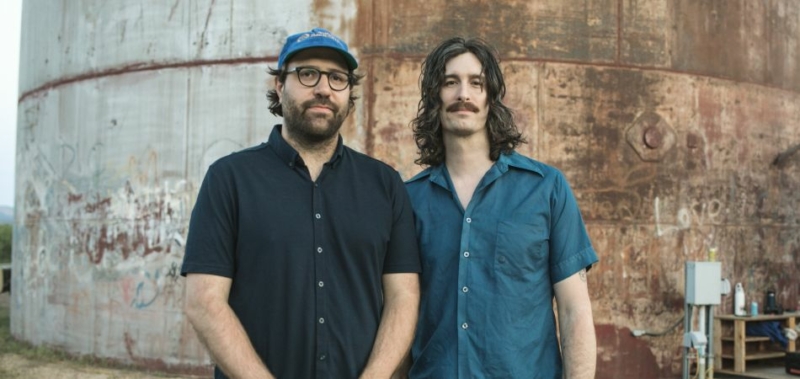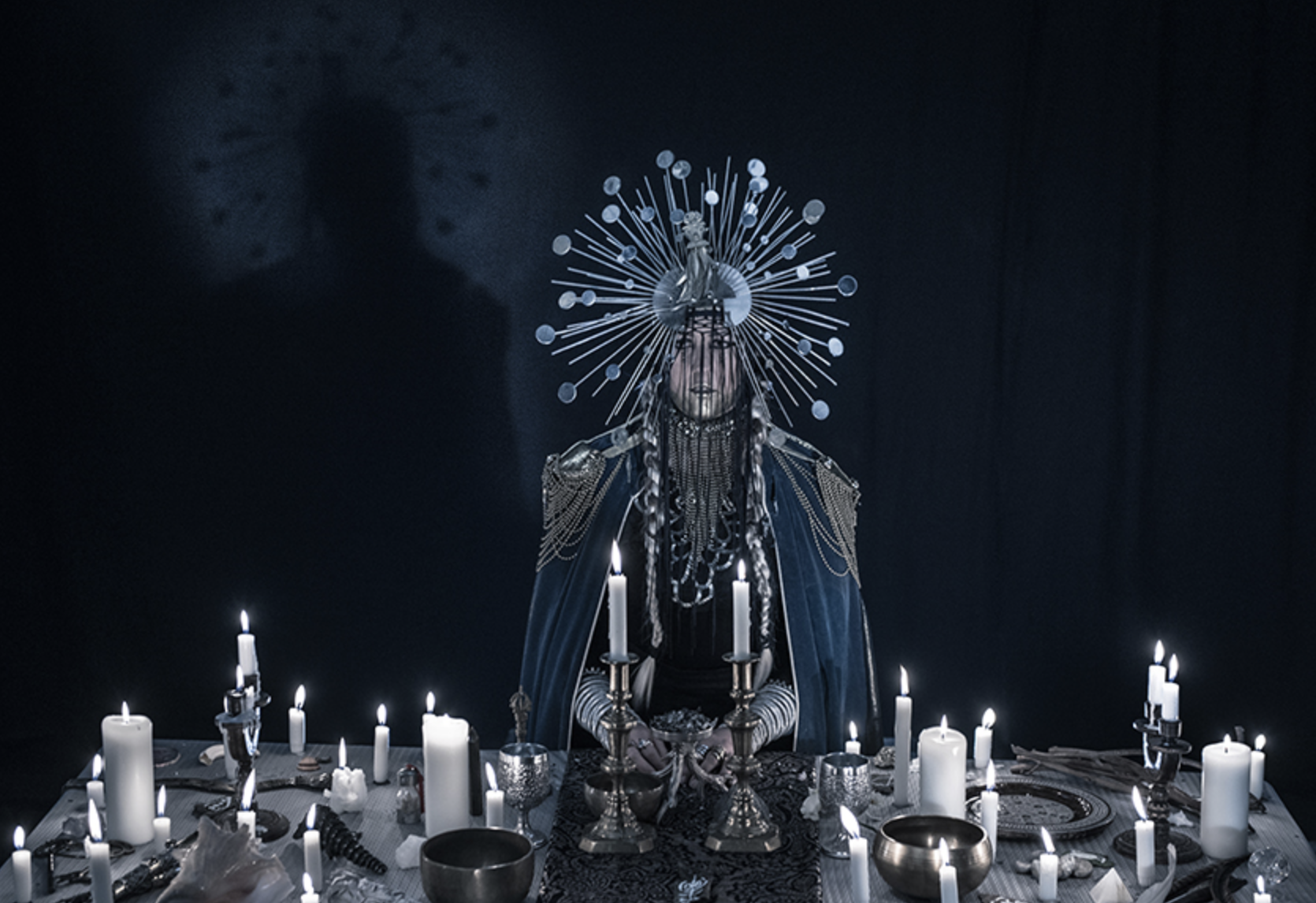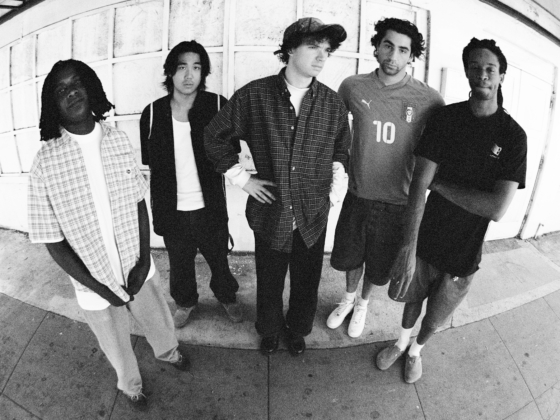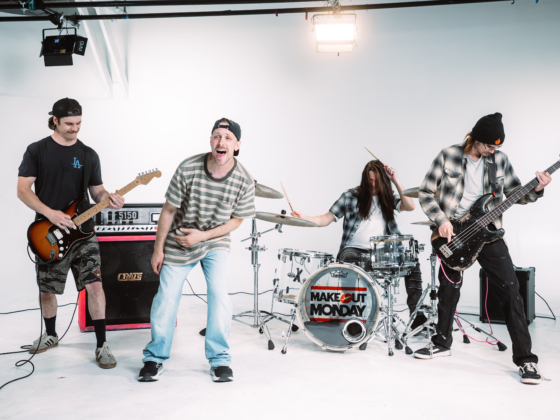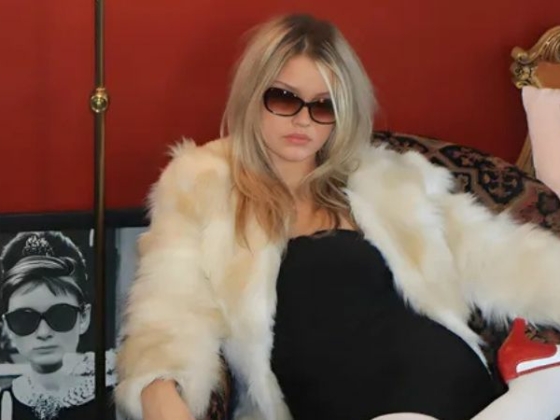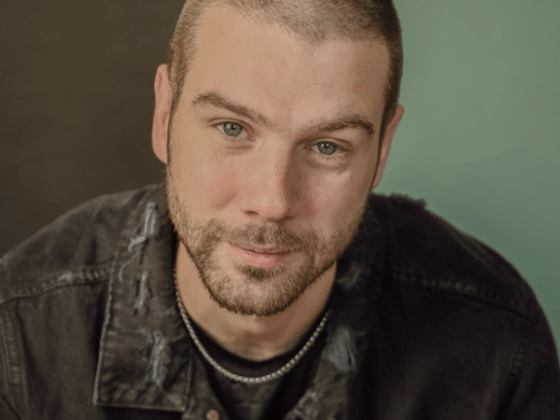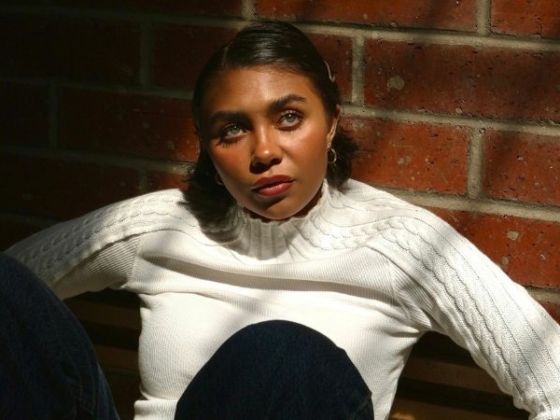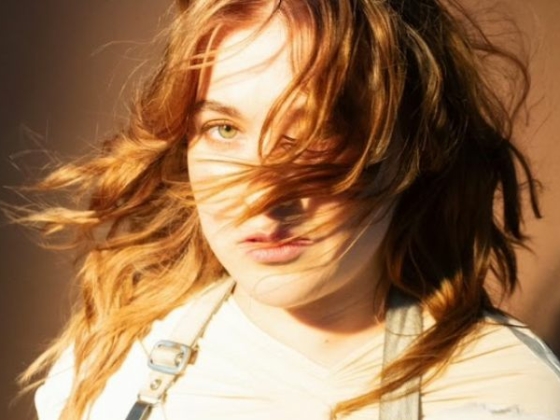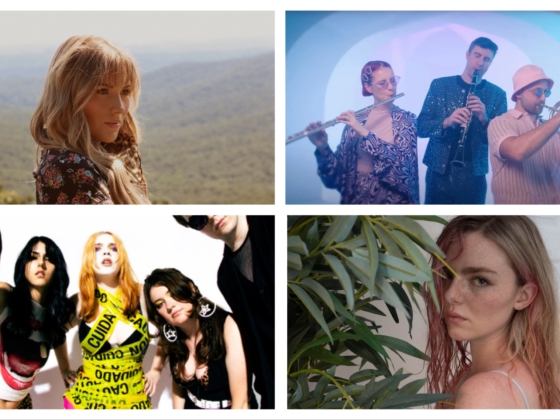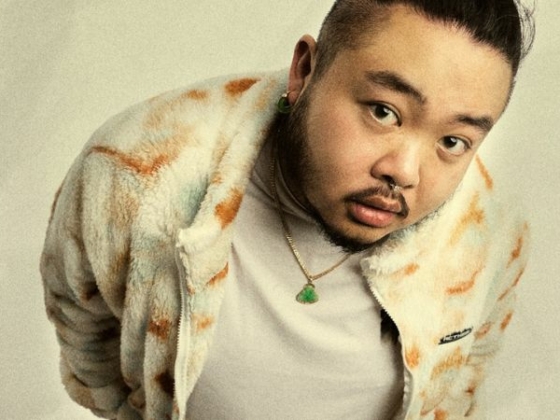It’s funny how the people you meet—or, in this case, play alongside—can become your musical partner in crime. Call it kismet, call it coincidence.
Judging by the sound of their self-titled record, it’s clear that Packaging—Daniel Lyon (lead vocals, guitar, production) and Daniel “Connor” Birch (keys, guitar, bass, production)—were meant to make music together.
The album effortlessly blends krautrock, psychedelic rock, and electronic elements into a cohesive whole.
Sitting down in a bustling Williamsburg coffee shop with 1 half of Packaging, Lyon opens up about the beauty of right time, right place, how their previous bands led him and Connor to this project, and the inspiration behind their debut.
How did you first meet your bandmate Connor, and what led you both to officially start the band?
I think we met in 2016. Both of our bands—mine was Spirit Award and his was Flaural—were doing a tour together. We met through mutual friends.
I was in Seattle; he was in Denver. It was kind of a nice trade-off because they had a good following there.
We had two really great shows and a bunch of weird shows in between, but we kind of bonded after that trip and just kept in contact.
Connor's the kind of person who will call you every week to catch up, and I like that. I've definitely been that person before.
We always wanted to do something again, but I just never really had the time. I think we started just for fun, working on songs during the day, and it was a fun little thing. We didn’t think much beyond that.
By the end of 2022, I flew out to Denver to hang out for four days. He had set up his production studio called Post Haus.
Connor does production and mixing for commercials, etc., so he basically has a space he can use for whatever he wants when he’s not working. It’s cool—two stories, with two little recording studios and a bedroom.
I basically went out there, and we just locked ourselves in the studio. The goal was just to have fun and make a couple of songs. We weren’t even trying to make a record; it was just for fun.
Over those four days, we ended up working on four or five songs. Some were based on demos; some we wrote in the studio together. By the end of that, we were like, “I think this is an album. We should just make it.”
So we started doing that—bringing in different collaborators and people we wanted to work with.
It wasn’t really a band; it was just him and me.
We used a lot of members from his band, Flaural, as the backing band, but we also pulled in other people we thought would be awesome to work with.
Everybody we asked was excited about it. I think coming out of that, people were just pumped to collaborate and be a part of something.
You brought in several notable contributors—from Luke Temple of Here We Go Magic, Ash Reiter of Sugar Candy Mountain, James Barone of Beach House, and more. How did those collaborations come about? Did you and Connor always envision working with them?
James Barone has been a good friend of Connor's for a long time, and then, I met James probably seven years ago or something.
James played drums for Spirit Award before, and he’s just a great person to have, but he's also just a percussion and engineering genius. We knew we wanted to have him on some stuff.
Ash was also a friend of Connor's. They had toured a bunch together, and we wanted to get her involved in some way.
So yeah, we asked her to sing on the record, and she actually played guitar, but somehow her husband accidentally erased it. So we never ended up hearing what the guitar was.
Luke was just somebody that I think both Connor and I always wanted to work with. When we wrote “Always Calling,” we were like, “I feel like you would do a really good job of mixing this and doing stuff.” And there we go.
Yeah, we just kind of mentioned to him, “If you want to do any harmonies or things, that would be awesome.” So he sent us something back with a bunch of harmonies and this subtle percussive thing, and it was just cool to collaborate with him, and it really elevated that song.
I’ve just found throughout this process it’s really fun—we'll work on this stuff for a long time, and I don't know, sometimes you get stuck, or it's just nice to have somebody else's fresh ears on things and to just add a little part or whatever it is, especially if you know that you love their stuff and you trust their taste.
It's been kind of freeing in that way, because I think in my other projects I’ve been the only one writing stuff, recording, and doing things, and so it's kind of a good relinquishing of power.
Even just working with Connor—having to compromise more, but just reminding yourself that you trust this person, and it's all just a conversation, figuring out compromises. You both want the best thing, and you're like, I know that you have good taste.
It doesn't mean that somebody's not wrong or something. Like, I've definitely fought for something and then been like, yeah, maybe that's not the same. But you need to trust their taste. They can elevate it. Sometimes they can bring up stuff again you don't want to be there—sometimes.
Like, that's part of it. I think I've definitely learned that from working with some producers early on—like, if it doesn’t really feel right and the whole time you're just like, I feel like I'm compromising everything and the whole vision of this—and I’ve done that, and then by the end, I don't want to show people this.
Yeah, I can only really think of mainly one instance when that happened, but yeah, it's such a delicate thing, because sometimes it's just the song not working once you get through the studio to record it.
I think starting out with songs, this was kind of the first record where I've written a lot of stuff just on, like, nylon guitar at first.
Your band name, Packaging, suggests a cynical view of the music industry—so how did it come about?
We were initially going to call ourselves “Dan Dan” because of our names. We had some strange coincidences with that as well: walking down an alley and looking up to see a sign that said “Dan Dan Lane,” and meeting the studio’s neighbor at 2 a.m., where we all introduced ourselves as Daniel.
This is where we borrowed the silly lyric for “Running Through the Airport”: “Daniel Daniel, I’m Daniel too, how many Daniels are in this room?”
While we were coming up with names—I’m not sure if I mentioned this before—one of us suggested “Packaging,” and it just kind of stuck.
The more it sat around, we couldn't decide; we just kept calling it Packaging, and we were like, “It’s Packaging.”
Throughout the process, we were talking about our starting process, like gathering seeds–which were our voice memos or the demos we’d send each other– then came the growing phase of growing a song, and then the harvesting.
It was like all these stupid metaphors for our process of doing stuff. By the end of it, we were just like: “We are Packaging, we’re about to wrap this thing.”
It was kind of funny.
The name gives some nods to the music industry–how it's changed, and all the hoops you have to jump through to be seen.
What themes or ideas are you exploring on this self-titled album?
I don't think we had a theme at the beginning. We were kind of letting whatever came out just flow.
After we had a few songs, we started to realize there was kind of a theme—loosely based on travel.
So we kind of just went with that. We're like, let's just make this the concept, and it has to be in these boundaries of travel—either physical, metaphysical, or even spiritual.
Yeah, so that was helpful for writing stuff too—having some constraints and finding out what it is.
I think sometimes I'll get stuck if I don't have a direction.
I don’t know, I feel like constraints can be really good for writing. Even musically, I think we decided to try and not have a lot of electric guitar, just because I feel like in our other bands, it's just been the thing—like guitar-driven and stuff.
We wanted to challenge ourselves in a way, so that was part of this process. It's like, “let's pick up the electric guitar as little as possible.”
It kind of ended up as, you know, stories—mostly stories about travel.
Do you and Connor follow a particular writing formula—for example, does melody usually come first and then lyrics, or is it more fluid?
Oh, yeah—I think it's both.
I think with this album, there were some demos that I brought in that were just a nylon guitar voice memo type of thing.
There were a couple of fleshed-out demos that I had, but really rough–they needed work.
I like working that way, having the roughest thing, because I feel like it's easy to get attached to something that’s more polished.
Yeah, Connor had some stuff that was pretty fleshed out. He had one idea that was pretty much done, where we only added a couple of things to it. We didn't change a whole lot about it.
But I think we took a lot of those demos and just messed with them. Like, we jammed with them.
We had a couple of songs where a couple of guys came in, and we just played the thing over and over—a groove—and usually that’s how I would just find a melody, just start singing.
You know, we’d do that over and over, and I feel like a lot of times I'll find a line or something that I like or, I don't know, something just comes out.
I feel like that's the best thing—you get lost in that creative process and it feels almost like it's not you doing it anymore, and you're just pulling from the ether.
So I think a lot of that stuff, just a good song off a line, or just finding things that feel phonetically good a lot.
You know, sometimes there are songs that I'm like, I don't really know what this means, but it feels good. The words make me feel something.
Love the cover art for the album, by the way—how did it come together?
That was kind of a lucky happenstance. I think we had talked about a cover for a long time, and Connor and I both have pretty strong views on stuff sometimes, and we couldn't decide on something.
We were in Seattle, going to shoot this music video for “Running Through the Airport,” and I had gotten this boat—this wooden rowboat—that we were using for a scene. I was like, okay, we have to make sure it floats and it's good.
So we took it to Lake Washington in Seattle and, yeah, just wanted to row out and make sure it was all good. It sounded like fun. There happened to be this guy there who had a drone. He was just taking pictures, video, and stuff.
He got really into it and was just there.
He was like, “Yeah, do you mind if I…” We were like, “No!” He said, “I’ll just send everything to you after.” I was like, “Sure, that's great.”
So he sent the photos, video, and stuff over, and I just looked at it and cropped it to the square, and I was like, “This is a cover.”
I'm like, “What else would it be?” Like, let's not try too hard to do this.
There were a lot of references to water in this record. It just felt right.
Do you have any favorite gear that you both turn to when creating?
We definitely used a lot of this delay pedal—it’s the Korg SDD-3000. It's real nerdy shit, but it's based on this outboard gear that they made into a pedal, basically, and does really cool stereo delay stuff.
We used it on a bunch of guitar, and then we ran a lot of my vocals through it at the end and processed them that way, just printing effects like that to send to whoever was mixing. We use Pro Tools. In the past, I've used Logic a bunch, but I've slowly merged over to Pro Tools.
For me, recently, now I know enough Pro Tools that I can usually make things go along quickly.
The thing is getting stuff all set up so you can record and just be in it, and not get bogged down by little things. For me, it just takes you out of it when you're like, “Oh shit, this thing is not working. Let me patch this other thing and…”
So we tried to do that a lot for this record. We set up a bunch of instruments that were all just plugged in so that we could bounce from one thing to another.
“Let's track bass on this now while it's fresh,” while we’re kind of ingrained in that world.
Like, it's funny because a lot of stuff we were recording was all live together.
We ended up retracting a bunch because we had stuff on the same track—like keys and whatever.
Connor's got racks of Wurlitzer, Juno, and Prophet. We used a lot of the API compressors.
I think the big thing that helped us a lot is–I got a U89 mic—just a beautiful, warm microphone. It's pretty versatile.
So we recorded all the vocals through that, some percussion stuff too. Yeah, just a really nice mic—it makes all the difference. Like, you could be recording really shitty stuff, but it sounds good.
-Added after the interview-
On their recording process, Connor added: “We experimented extensively with percussion, using cuicas, a triangle, a Guatemalan wood block, and congas. I had an amazing time recording cello and clarinets, including the bass clarinet.
We also explored vocal effects with the Boss DD20, Alesis Midiverb II, and Korg SD3000, and dove deep into synth work—especially with the Prophet 10 and the DX7. The DX7’s fretless acoustic bass patch features prominently on a few tracks.”
Were there any songs on the album that felt especially emotional or resonated with you more than others?
There are a few that did. I mean, I have ones that I really love.
I feel like one I got lost in was “Water’s Edge.”
We played it so many times and were in this hazy state too—like playing it and just looping it over and over, just jamming it for hours, and it was just such a fun groove. But kind of a weird song.
That was the first song that we worked on. So that one feels special. It's like where we found this little turnaround part, and it just felt good.
Then I think it became pretty emotional and a special song for both of us–just because I think we ended up writing it late at night, and it started out with just this kind of wall of sound— guitar and bass, like this chuggy thing—and we slowly just kind of dissected it, took things away where it became more dynamic.
Yeah, I think just lyrically it feels more emotional to me.
Some of the final shows, Connor was doing some synth lines on it–I don't know, it just felt really good. It was like, that's it. That's what it needed.
“Didn’t Want to Stay,” we wrote together and were able to both give it a story. It kind of came about like this: we would go to this coffee shop near the studio, Coffee of Nowhere, and the guy, Brandon, who owned it and worked there, he’s from Amarillo, Texas.
So we were just talking and we were like, “this should be about Amarillo, Texas.” So I think it just worked its way into that song, and we were like, yeah, that's deciding for this—this little town in Texas.
I didn't even associate much of the yellow thing in the cover art with our song “Amarillo.” But just little stuff like that that just happened to work together to make the album feel like it's all tied together.
Do you want to share a little bit of the story behind the lyrics?
I think the general idea of “Didn’t Want to Stay” is based on a simple, basic thought: thinking about the things that are going to make you happy.
I don’t know, just thinking about if I grew up rich when I was really young—if I had all the money I could want by the age of 23—how depressing that would be in a way. I don’t think a lot of people would feel that way though.
Essentially, it was about a father dying a premature death and the son inheriting all this money. I think there are a lot of other themes, left a bit up to interpretation.
Generally, it’s the thought that material things can make you happy for a little while, but eventually that feeling feels fleeting—at least to me, from my experience. It’s not like having a brand-new Mercedes or whatever.
Ultimately, what do you hope listeners take away from this album, and what’s next for both of you after its release?
I just hope that people enjoy this record, listen to the whole thing, and get lost in it.
I feel like we tried to create a world and vibes that are cohesive and that you can live in, and it tells a story.
Yeah, we say it's a record about travel—it's best listened to while traveling. It's good for that. You know, I've listened to “Running Through the Airport” while running through the airport—it holds up.
Yeah, that song was written after I literally ran through the airport and got to the studio, and I was like… "We need to call the next song 'Running Through the Airport.' Let's figure out how to do it."
We’re doing some touring–a little West Coast run in November, and then we were talking about maybe doing Europe in the spring or early summer.
Yeah, just kind of filling it out. I mean, we're throwing out ideas now, like stuff for another record or some more songs.

